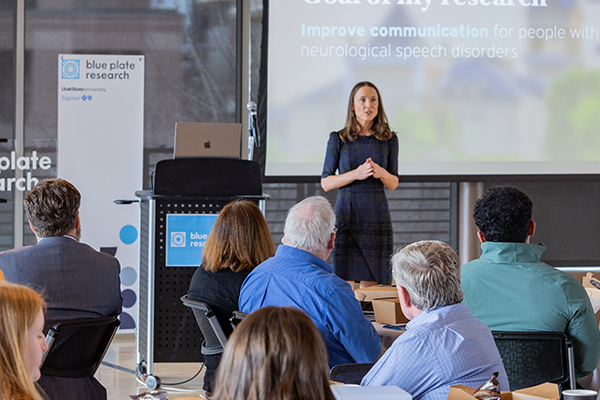COMDDE Associate Professor Receives $2.3M Grant from NIH for Parkinson’s Communication Research

Borrie describes successful conversation as a “dynamic and deeply cooperative joint activity.”
Stephanie Borrie, associate professor in the Department of Communicative Disorders and Deaf Education, was awarded a $2.3M, five-year grant from the National Institutes of Health for her research in improving participation in conversations for people with Parkinson’s disease and other neurological disorders. Her research, which examines the impact of neurological conditions such as stroke, brain injury, and Parkinson’s disease on conversation, studies the ways communication partners can work together to improve conversations.
Recently, Borrie was featured at a Blue Plate Research event, sponsored by the USU Office of Research, in which she presented on her work titled “The Science Behind the Art of Conversation.” Borrie explained that conversations are integral to our daily lives. They serve as the foundation for building and maintaining relationships, conducting work, raising children, accessing services, engaging in our communities, and much more. “Good conversation is co-created by both partners,” she said. “In order to effectively address conversation, we need to look at the system, not just the person with Parkinson’s disease.”
“The Blue Plate event was an opportunity to communicate my research and the importance of being active participants in conversations to the wider community,” explained Borrie. “Science tells us that to experience successful conversations, we cannot function as individual entities—you, me. Rather, we must collaborate our behaviors, coordinating our speech in meaningful ways.”
Borrie explained her research at the event and discussed the ways that communication partners can work together to improve conversations. Although the act of having a conversation may seem straightforward, it actually involves a complex coordination of behaviors that require communication partners to make constant adaptations in order to understand one another and ensure a smooth interaction. She described successful conversation as a “dynamic and deeply cooperative joint activity.”

Stephanie Borrie presents her research at the Blue Plate Research event in Salt Lake City on March 21, 2024.
To improve conversations for people with Parkinson’s disease, Borrie’s grant project brings together a team of talented researchers across speech science, signal processing, and computational modeling. To identify what is causing a breakdown in a conversation, the researchers will examine the behaviors and patterns exhibited by the conversational partners in the study as well as the participants with Parkinson’s disease. “We are currently in the data collection phase of the project, which requires collecting hundreds of conversations from people with and without Parkinson’s disease,” said Borrie. “If anyone is interested in being involved, they can check out my lab website for more details.”
The targeted goals for Borrie’s study are to gain a deep understanding of the barriers to successful interactions for people with Parkinson’s disease and to develop evidence-based interventions to improve their ability to fully participate in conversations. “Despite the fact that conversation is challenging for people with Parkinson’s disease, we really don’t have a lot of research on what is going on and how to improve it,” said Borrie. “We want to help people with Parkinson’s disease feel more confident, heard, and engaged in their everyday interactions.”
Ultimately, Borrie’s work aims to help people with or without Parkinson’s disease have better conversations and feel more involved and included in social interactions. “The next time you are having a difficult conversation—maybe with someone with a communication disorder or someone who is just hard to connect with—what role can you play to have a more successful conversation?” asked Borrie. “There is a role for all of us.”

